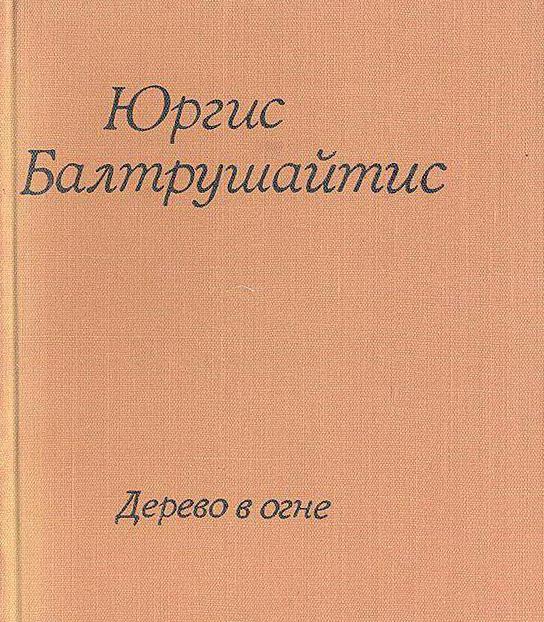Jurgis Baltrušaitis: Biography and Creativity
Jurgis Baltrushaitis is a poet, who is knownvery little. His name is found in textbooks or is mentioned in the memoirs of contemporaries. Works Baltrushaitis rarely enter into a poetic anthology. A small selection can be found only in the book "Poets of the Silver Age." Meanwhile, Jurgis Baltrushaitis - a figure in the literature is not ordinary. Biography of the poet, translator and diplomat - the topic of the article.

Yurgis Kazimirovich Baltrushaitis was born in 1873year, not far from the Lithuanian city, now called Kaunas. His whole life was filled with contradictions. The native language of Baltrušaitis was Lithuanian. Nevertheless, in literature he is known as a Russian poet-symbolist.
early years
A boy from a poor peasant familyindependently learned to read and write. Towards the teachings, Jurgis displayed an extraordinary desire. At the age of twelve, I entered a gymnasium, and three years later I began to earn my living by going to school.
In 1893, Jurgis Baltrušaitis decided to continueeducation in Moscow. He entered the University of Physics and Mathematics, but during his studies he found time for writing. In addition, Baltrushaitis listened to lectures on history, philology, and studied foreign languages. Among the students of the Moscow University, already in those years he was known as an incredibly gifted linguist.

In 1899, a young Lithuanian poet met withrepresentatives of symbolism - Balmont and Bryusov. Together, the publishing house "Scorpion" was created. In the same year, Jurgis Baltrušaitis secretly married the daughter of the millionaire Maria Olovyashnikova.
Critic
Baltrusaitis in the early twentieth century waswidely known in literary circles. And above all, his critical articles. He collaborated with such magazines as "Rus", "Pravda", "Russian Thought". Baltrushaitis showed exceptional self-discipline, and therefore issued only two books of poems ("Mountain Road", "Earth's Steps").
The poet took an active part in the literarylife. Despite this, he was extremely humble and reserved. For the calmness and reliability of Baltrušaitis, colleagues valued. He maintained warm friendly relations with famous cultural figures, among whom were such celebrities as Stanislavsky, Skryabin, Komissarzhevskaya.
After the revolution
Baltrushaitis helped many writers,organizing them to travel abroad. After the revolution, he served as chairman of the All-Russian Union of Writers. Since 1939 he was an employee of the Lithuanian Embassy in France. Baltrusaitis and in Paris did not stop literary activity. But the last compilation, which took several years to prepare, was published after the author's death. The Lithuanian poet created over four hundred poems, subsequently translated into German, Polish, Latvian, English and other languages.
Poet-Symbolist
In the late nineteenth century, France was borndirection in art, which later penetrated into poetry. We are talking about such literary flow as symbolism. But it should be said that in Russian poetry this direction had unique original features.

One of the most outstanding representatives of the Russiansymbolism is Yurgis Kazimirovich Baltrushaitis. "Moon Wings" is a work whose hero embodies serenity and sadness. This is the only poem of the Lithuanian poet, included in the school curriculum. What thoughts and emotions did the lyric hero of the product "Moon Wings" Yurgis Baltrušaitis have?
Analysis of the poem
The author describes a moonlit night. Everything ceases, but somewhere in the distance - daytime reality. With moonlight, he compares the lyrical hero in the poem "Moon Wings" by Jurgis Baltrushaitis. Analysis of the poet-symbolist's work is not easy. To do this, you need to have an idea of the author himself. Probably Baltrusaitis devoted a poetic composition to the illusory nature of being. The author contrasts the "slave of dreams" with "the fall of all fetters." However, after overcoming all obstacles, the lyrical hero disappears with the moonlight. The poem is filled with sadness. As an artistic means, which enhances the emotional effect of the work, the poet uses repetitions of the "and" union.
Features of the poems
Baltrushaitis sought to find a poetic form, inwhich would merge feelings and thoughts. Among critics, there is no consensus about the style of this poet. Some researchers see in his creations mysticism. Others are abstract philosophies. A characteristic feature of Baltrushaitis' creativity is still the proximity to symbolism.

It is noteworthy that although he had a Lithuanianorigin, poetry, he wrote mostly in Russian. Poetic works by Jurgis Baltrushaitis translated into Lithuanian Linas Broga. In his native language the poet published three collections.
Poems in Lithuanian
The first work was published in 1927. Over the next ten years, the poet wrote poetry in Lithuanian. But to unite them in the collection was possible only in Paris. In the French capital, the books "The Wreath of Tears", "The Smoke of the Altar" were published. In the forties, Baltrusaitis also created the "Housewarming" poem.
Transfer
The hero of this article made a significant contribution to thelinguistics. His name is connected not only with the poetry of symbolism, but also with the artistic translation. He was not just a polyglot. Baltrušaitis translated works of classics of world literature, which at the beginning of the century were famous throughout Europe.
The Lithuanian linguistdramatic works, poems and poems. Thanks to the work of Jurgis Baltrushaitis, the repertoire of Russian theaters included works by Byron, Ibsen, Knut Hamsun. He also translated works by Oscar Wilde, Herman Zuderman, Maurice Maeterlinck, Gunnar Heyberg. With the work of the Indian poet and writer Rabindranath Tagore, Russian-speaking readers also got acquainted with the translations of Jurgis Kazimirovich Baltrushaitis.

In 1916, under the editorship of Bryusov, an anthology of Armenian poetry appeared. In the translation of the poems included in the collection, Jurgis Baltrušaitis took a recent part.
Diplomat
Since 1920, Baltrušaitis has held a positionrepresentative of the Republic of Lithuania in Russia. Then he was an ambassador to Turkey, Persia. Since 1932, the poet and translator received the title of Honorary Doctor of the University of Kaunas. The last years of Baltrusaitis were held in Paris. In France, the poet went on duty. Jurgis Baltrusaitis died in 1944, is buried in the cemetery of Montrouge.










